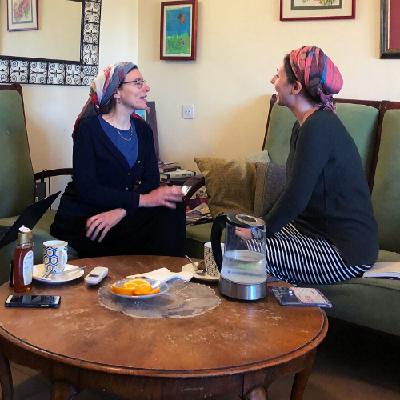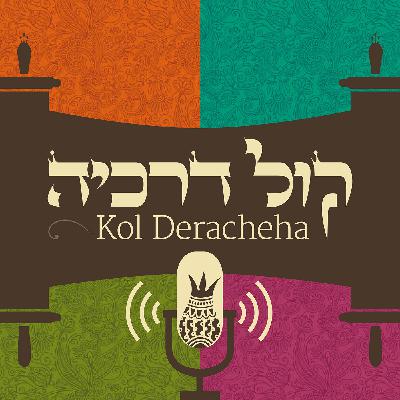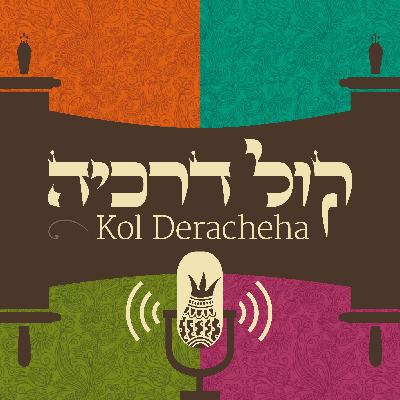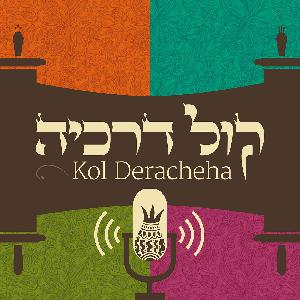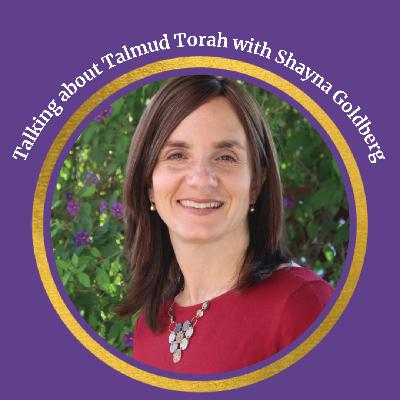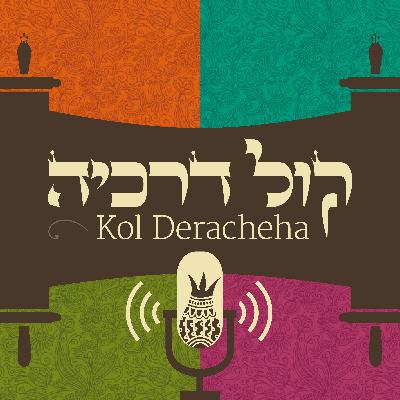Discover Kol Deracheha
Kol Deracheha

Kol Deracheha
Author: Rachel Leshaw
Subscribed: 20Played: 508Subscribe
Share
Description
Welcome to Kol Deracheha, a podcast about women and mitzvot, from deracheha.org, a Yeshivat Har Etzion Initiative.
Our name comes from the pasuk in Mishlei 3:10, which says "be-chol derachecha da'ehu." "In all your ways, know God." We've changed that to Kol Deracheha, which means "all her ways," and also "the voice of Deracheha."
Our goal is that Kol Deracheha will inspire you wherever you walk on the pathways of Torah.
Season 1 of Kol Deracheha is dedicated in memory of Mrs. Anita Hirsch Silverman, Yehudit Raizel bat Eliezer v'Esther, zichrona livracha.
Our name comes from the pasuk in Mishlei 3:10, which says "be-chol derachecha da'ehu." "In all your ways, know God." We've changed that to Kol Deracheha, which means "all her ways," and also "the voice of Deracheha."
Our goal is that Kol Deracheha will inspire you wherever you walk on the pathways of Torah.
Season 1 of Kol Deracheha is dedicated in memory of Mrs. Anita Hirsch Silverman, Yehudit Raizel bat Eliezer v'Esther, zichrona livracha.
112 Episodes
Reverse
In this special behind the scenes episode, Rachel speaks to Laurie about tzeniut, and the challenges of writing about tzeniut as its own concept, not as it relates to clothing. Plus some thoughts on coronavirus, trampolines and backyard weddings. To read the sources referenced, click here https://www.deracheha.org/tzeniut/
Why is it important for women to engage directly with halachic texts? In this introduction to Deracheha we'll discuss the different ways Jewish tradition can be transmitted, and the role Jewish women have played in that transmission throughout Jewish history. To read the sources mentioned in this episode, click here https://www.deracheha.org/concepts-introduction/
Join us as we meet Laurie Novick, Deracheha's Site Director, and learn more about her goals for the site. We'll discuss everything from favorite holidays to the ways Deracheha is changing the conversation around the role women play in transmitting halacha. Trust us, you don't want to miss this conversation! Want to read more about women and halacha? Click here https://www.deracheha.org/concepts-introduction/
What is the mitzvah of learning Torah? Does it apply to women? In this episode we'll see that the definition of Talmud Torah is more broad than we might have thought, although women are exempt from studying Torah in a formal way. To read the sources mentioned in this episode, click here https://www.deracheha.org/learning-torah/
What is a woman's obligation in Torah study? The Talmud teaches that women are exempt from the Torah-level obligation to learn or teach Torah. What does this mean women should actually do? In this episode we'll explore opinions that approve or disapprove of a father teaching Torah to his daughter, and discuss how this influences the obvious obligation for women to know basic halacha in order for them to practice as observant Jews. To read more about the sources mentioned in this episode, click here https://www.deracheha.org/learning-torah-2-obligation/
What early opportunities developed for women’s formal Torah study? On what halachic basis? To read the sources mentioned in this episode, click here https://www.deracheha.org/learning-torah-3-openings/
What areas of Torah may, and should, a woman study? And how? In this episode we'll discuss different modern approaches to women studying Oral Torah, from those who approve on a limited basis, to those who believe it's an absolute imperative at this stage in time. To read the sources mentioned in this episode, click here https://www.deracheha.org/learning-torah-4-what-to-study/
Join us as we speak to Shayna Goldberg, contributing editor at Deracheha, about how Torah influences her life and what she envisions for her students.
Was gender hierarchy built into creation? Are men and women really created equal? All this, and more, in the first of our three-part series on women's status in Judaism
After establishing in our previous podcast than men and women are viewed as having equal sanctity in Judaism, we'll explore the halachic obligations of men and women - when are they the same and when are they different? We'll discuss rules of thumb for gender differences in halacha, and how we're meant to understand these differences.
Why are women generally exempt from positive time-bound mitzvot? We'll discuss the rule, exceptions, and possible rationales, including whether these explanations are "just apologetics".
May a woman perform mitzvot voluntarily? The test case is semicha (Wikipedia)Smicha or semikhah (Hebrew: סמיכה, "leaning [of the hands]"), also smichut (סמיכות, "ordination"), smicha lerabbanut (סמיכה לרבנות, "rabbinical ordination"), or smicha lehazzanut (סמיכה לחזנות, "cantorial ordination"), is derived from a Hebrew word which means to "rely on" or "to be authorized". ">semicha, leaning on a sacrifice, a ritual from which women are exempt. We;ll also discuss the halachic meaning of voluntary performance, whether it can become like obligation, and whether voluntary mitzva performance is encouraged.
In our last podcast we discussed the general value of voluntary mitzva performance. This week we're discussing whether it's appropriate to make a beracha when voluntarily performing a mitzva. We'll discuss the purpose of a birkat hamitzva, the possible concerns with reciting one in this case, and the differences in practical halacha for Ashkenazim and Sefardim. Read the full article here: https://www.deracheha.org/beracha-on-voluntary-performance/
Challa, candle-lighting and nidda are three mitzvot in which women's performance takes precedence over men's. Taken together, what do they teach us about women and halacha?
In this podcast, the first of our series on women's prayer, we'll identify prayer as "rachamei", seeking divine mercy. We'll discuss the various opinions about whether the obligation to pray daily is Biblical or Rabbinic, and how that relates to women's obligation in prayer. To see all the sources referenced in this episode, check out the article on our site here: https://www.deracheha.org/prayer-1-obligation/
Last week we spoke about women's obligation in prayer in general. This week we'll focus on shemoneh esrei specifically. Do women have an obligation to recite Shemoneh Esrei? How many times a day? Are there justifications for women who recite fewer than two shemoneh esreis a day? We'll discuss all the different halachic approaches to this question, taking into account the different lived experiences of women at different periods in their lives. To see all the sources referenced in today's podcast, check out the full article on our site here: https://www.deracheha.org/prayer-2-shemoneh-esrei/
This episode continues our eight part series on prayer. We've already discussed the general obligation of women in prayer, including shemoneh esrei, and now we're going to start from the beginning, discussing the prayers we say immediately upon waking up. In this episode we will discuss why we start our day the way we do, and the specific question of whether women are obligated in the birchot hatorah. To see all the sources referenced in today's podcast, check out the full article on our site here: https://www.deracheha.org/prayer-3-upon-arising/
This week is the fourth installment in our series on prayer. We've already discussed the general obligation of women in prayer, including shemoneh esrei, and the prayers we say immediately upon waking up. In this week's podcast we are going to talk about what follows the initial berachot, namely, the recitation of bikot hashachar. To see all the sources referenced in today's podcast, check out the full article on our site here: https://www.deracheha.org/prayer-4-birchot-ha-shachar/
Today we're going to continue our series on prayer. We've already discussed the general obligation of women in prayer, including shemoneh esrei, the prayers we say immediately upon waking up, and birkot hashachar. In this week's podcast we're going to zoom in and take a closer look at the first 3 brachot of birkot hashachar. To see all the sources referenced in today's podcast, check out the full article on our site here: https://www.deracheha.org/prayer-5-she-lo-asani-isha-she-asani-kirtzono/
This week is the fifth installment in our series on prayer. We've already discussed the general obligation of women in prayer, including shemoneh esrei, the prayers we say immediately upon waking up, and birkot hashachar. Today we're going to continue our series on prayer and talk about korbanot and psukei dezimra. To see all the sources referenced in today's podcast, check out the full article on our site here:https://www.deracheha.org/prayer-6-pesukei-de-zimra/


